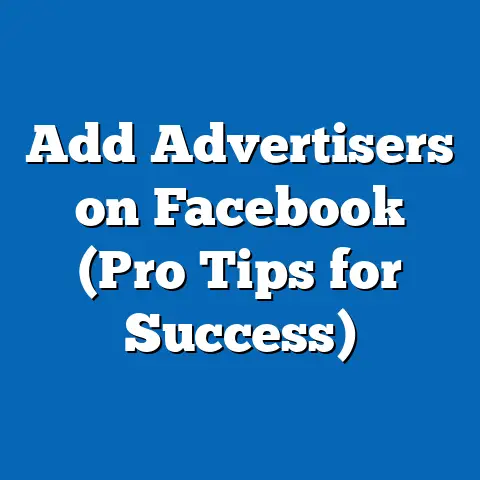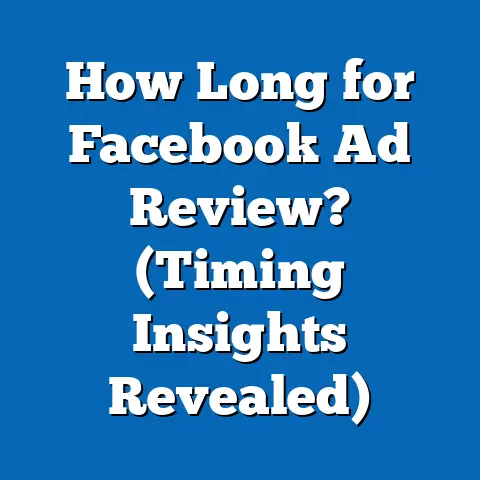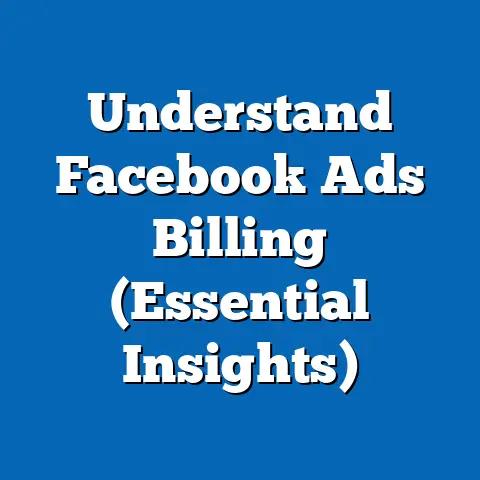Do I Need to Pay GST for Facebook Ads? (Tax Insights Revealed)
The aroma of freshly baked cookies filled our kitchen, a familiar scent that always brought the family together.
As a kid, I remember watching my parents juggle their full-time jobs with their passion project – a small bakery they ran from home.
They poured their hearts into every recipe, and their dedication was inspiring.
Today, many families are starting their own ventures, side hustles born from a shared passion and a desire for financial independence.
In today’s digital world, many families are turning to online advertising, particularly Facebook ads, to promote these ventures.
It’s a powerful way to reach new customers and grow their businesses.
But with the rise of digital marketing comes a new set of questions, especially when it comes to taxes.
If you’re a family-run business or a side hustle, do you need to factor in Goods and Services Tax (GST) when paying for Facebook ads?
It’s a crucial question that can impact your bottom line and keep you on the right side of the law.
Let’s dive in and unravel the mysteries of GST and Facebook advertising.
Understanding Facebook Ads
Facebook ads have revolutionized the way businesses, big and small, connect with their target audience.
They are essentially paid messages that businesses use to reach specific demographics, interests, and behaviors on Facebook and Instagram (which is owned by Meta, Facebook’s parent company).
The Significance of Facebook Ads in Digital Marketing
In the vast landscape of digital marketing, Facebook ads stand out as a highly effective tool.
With billions of active users worldwide, Facebook offers unparalleled reach and targeting capabilities.
I’ve personally seen businesses transform their online presence and sales figures using well-crafted Facebook ad campaigns.
The platform’s robust targeting options allow you to pinpoint your ideal customers based on their age, location, interests, and even their online behavior.
Types of Facebook Ads
Facebook offers a variety of ad formats to suit different marketing goals.
Here are some of the most common:
- Image Ads: These are simple ads that use a single image and text to convey your message.
They’re great for showcasing products or services visually. - Video Ads: Video ads are more engaging and can tell a story or demonstrate a product in action.
They’re perfect for capturing attention and building brand awareness. - Carousel Ads: Carousel ads allow you to display multiple images or videos in a scrolling format.
This is ideal for showcasing a range of products or highlighting different features of a single product. - Collection Ads: Collection ads are designed for e-commerce businesses.
They feature a main image or video along with a selection of products that users can browse and purchase directly from the ad. - Lead Ads: Lead ads are designed to capture leads directly from Facebook.
They use a simple form that users can fill out without leaving the platform, making it easy to collect contact information.
Why Families and Small Businesses Use Facebook Ads
Families and small businesses leverage Facebook ads for several key reasons:
- Targeted Reach: As mentioned earlier, Facebook’s targeting capabilities are incredibly powerful.
This allows small businesses to reach their ideal customers without wasting money on advertising that reaches the wrong audience. - Cost-Effectiveness: Compared to traditional advertising methods like print or television, Facebook ads can be much more cost-effective.
You can set a budget that works for your business and track your results to ensure you’re getting a good return on investment. - Measurable Results: Facebook provides detailed analytics that allow you to track the performance of your ads.
You can see how many people are seeing your ads, clicking on them, and making purchases.
This data helps you optimize your campaigns for better results. - Brand Building: Facebook ads can help you build brand awareness and establish a connection with your target audience.
By creating engaging content and targeting the right people, you can build a loyal customer base.
Takeaway: Facebook ads are a valuable tool for families and small businesses looking to reach a wider audience and grow their businesses.
Understanding the different ad formats and targeting options is crucial for creating effective campaigns.
What is GST?
Now that we’ve covered Facebook ads, let’s delve into the world of GST.
GST, or Goods and Services Tax, is a consumption-based tax levied on the supply of goods and services.
It’s a value-added tax, meaning that it’s applied at each stage of the production and distribution process, with businesses able to claim back the GST they’ve paid on their inputs.
Understanding GST: A Clear Definition
In simple terms, GST is a tax that you pay when you buy something or use a service.
It’s a significant source of revenue for governments around the world and is designed to be a fair and efficient way to fund public services.
How GST Works
The GST system works by allowing businesses to claim back the GST they’ve paid on their purchases (inputs) and then charging GST on their sales (outputs).
The difference between the GST they collect and the GST they pay is remitted to the government.
This system ensures that the tax is only paid on the value added at each stage of the supply chain.
For example, let’s say a baker buys flour for $100 + $10 GST.
They can claim back the $10 GST they paid on the flour.
When they sell the bread they make with the flour for $200 + $20 GST, they collect $20 GST from their customers.
They then remit the difference ($20 – $10 = $10) to the government.
Relevance to Small and Family-Run Enterprises
GST is particularly relevant to small and family-run enterprises because it can impact their pricing, cash flow, and compliance obligations.
It’s essential for these businesses to understand how GST works and how it applies to their operations.
The Purpose of GST
The primary purpose of GST is to fund government services and infrastructure.
The revenue generated from GST is used to pay for things like healthcare, education, roads, and other essential services.
By implementing a GST system, governments can ensure a stable and reliable source of funding for these important programs.
Takeaway: GST is a consumption-based tax that affects businesses of all sizes.
Understanding how it works and how it applies to your business is crucial for compliance and financial management.
GST Applicability on Facebook Ads
This is where things get interesting.
Does GST apply to Facebook ads?
The answer, like many things in the tax world, is “it depends.” The applicability of GST on Facebook ads depends on several factors, including your business’s GST registration status, revenue thresholds, and the location of Facebook’s services.
Scenarios and GST Implications
Let’s break down some common scenarios and their GST implications:
- Businesses Registered for GST: If your business is registered for GST, you can generally claim back the GST you pay on Facebook ads as an input tax credit.
This means that you can deduct the GST you paid on your advertising expenses from the GST you collect on your sales. - Businesses Not Registered for GST: If your business is not registered for GST, you cannot claim back the GST you pay on Facebook ads.
This means that the GST you pay on your advertising expenses is simply an expense that reduces your taxable income. - Revenue Thresholds: In many countries, there’s a revenue threshold below which businesses are not required to register for GST.
If your business’s revenue is below this threshold, you may not need to register for GST, and you won’t be able to claim back the GST you pay on Facebook ads. - Location of Facebook’s Services: Facebook’s advertising services are typically considered to be provided from outside the country where your business is located.
This can have implications for GST, depending on the specific rules in your country.
Official Guidelines and Resources
To get a definitive answer on whether GST applies to your Facebook ads, it’s essential to consult official guidelines and resources from your country’s tax authorities.
These resources will provide specific information about GST registration requirements, input tax credits, and the treatment of digital advertising services.
Common Misconceptions About GST and Digital Advertising
There are several common misconceptions about GST and digital advertising.
One common misconception is that GST only applies to physical goods.
In reality, GST also applies to many digital services, including Facebook ads.
Another misconception is that small businesses don’t need to worry about GST.
While it’s true that there are revenue thresholds below which registration is not required, it’s still important to understand the rules and ensure that you’re complying with the law.
Takeaway: The applicability of GST on Facebook ads depends on several factors.
Consulting official guidelines and resources from your country’s tax authorities is crucial for understanding your obligations.
How to Calculate and Report GST on Facebook Ads
So, you’ve determined that GST applies to your Facebook ads.
Now what?
Let’s walk through the process of calculating and reporting GST on your advertising expenses.
Step-by-Step Guide to Calculating GST
- Determine the GST Rate: The first step is to determine the GST rate in your country.
This rate will vary depending on where you’re located. - Calculate the GST Amount: Once you know the GST rate, you can calculate the GST amount by multiplying the cost of your Facebook ads by the GST rate.
For example, if you spend $100 on Facebook ads and the GST rate is 10%, the GST amount is $10 ($100 x 0.10). - Record the GST Amount: It’s essential to keep accurate records of the GST you pay on your Facebook ads.
This will make it easier to claim input tax credits when you file your GST return.
Examples of GST Calculations
Let’s look at a couple of examples:
- Example 1: You spend $500 on Facebook ads, and the GST rate is 15%.
The GST amount is $75 ($500 x 0.15). - Example 2: You spend $1,000 on Facebook ads, and the GST rate is 10%.
The GST amount is $100 ($1,000 x 0.10).
Reporting GST on Business Tax Returns
When you file your business tax return, you’ll need to report the GST you’ve paid on your Facebook ads.
This typically involves completing a specific section of the tax return and providing supporting documentation, such as invoices from Facebook.
It’s essential to keep accurate records of all your GST transactions and to follow the instructions provided by your country’s tax authorities.
If you’re unsure about how to report GST on your tax return, it’s best to seek professional advice from an accountant or tax advisor.
Takeaway: Calculating and reporting GST on Facebook ads is a straightforward process, but it’s essential to keep accurate records and follow the instructions provided by your country’s tax authorities.
Case Studies
To illustrate the real-world implications of GST on Facebook ads, let’s look at a few case studies of family-run businesses that have navigated this issue.
Family-Run Businesses Navigating GST
- The Cookie Jar (Retail): The Cookie Jar is a small bakery run by a family.
They use Facebook ads to promote their delicious cookies and cakes.
Because their revenue is above the GST registration threshold, they are registered for GST.
They claim back the GST they pay on their Facebook ads as an input tax credit, which helps to reduce their overall tax burden. - The Handy Helpers (Services): The Handy Helpers is a family-run handyman service.
They use Facebook ads to reach new customers in their local area.
Because their revenue is below the GST registration threshold, they are not registered for GST.
They cannot claim back the GST they pay on their Facebook ads, but they do factor it into their pricing. - The Online Emporium (E-commerce): The Online Emporium is an e-commerce business run by a family.
They sell a variety of products online and use Facebook ads to drive traffic to their website.
Because their revenue is above the GST registration threshold, they are registered for GST.
They collect GST on their sales and remit it to the government.
They also claim back the GST they pay on their Facebook ads as an input tax credit.
Diverse Industries and Scenarios
These case studies illustrate how GST can affect different types of businesses in different industries.
Whether you’re a retailer, a service provider, or an e-commerce business, it’s essential to understand your GST obligations and how they apply to your Facebook advertising expenses.
Outcomes of GST Decisions
The decisions that these businesses have made regarding GST have had a significant impact on their financial performance.
By claiming input tax credits, businesses that are registered for GST can reduce their overall tax burden and improve their profitability.
Businesses that are not registered for GST need to factor the GST they pay on their advertising expenses into their pricing to ensure that they’re still making a profit.
Takeaway: Real-world examples demonstrate the importance of understanding GST implications for Facebook advertising expenses.
Conclusion
As we’ve seen, the question of whether you need to pay GST for Facebook ads is not a simple one.
It depends on a variety of factors, including your business’s GST registration status, revenue thresholds, and the location of Facebook’s services.
Key Points Summarized
- Facebook ads are a powerful tool for reaching a wider audience and growing your business.
- GST is a consumption-based tax that affects businesses of all sizes.
- The applicability of GST on Facebook ads depends on several factors.
- Calculating and reporting GST on Facebook ads is a straightforward process, but it’s essential to keep accurate records.
- Real-world examples demonstrate the importance of understanding GST implications for Facebook advertising expenses.
Importance for Families and Small Businesses
For families and small businesses, understanding GST implications is crucial for financial management and compliance.
By understanding the rules and following the proper procedures, you can ensure that you’re on the right side of the law and that you’re maximizing your profitability.
Embrace Digital Advertising Responsibly
In conclusion, I encourage you to embrace digital advertising for your ventures while being informed about your tax responsibilities.
Facebook ads can be a powerful tool for growing your business, but it’s essential to understand the GST implications and to factor them into your financial planning.
Remember, being informed is the first step to success!






